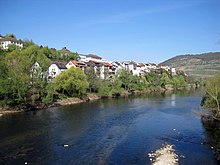Bingerbrück (German pronunciation: [bɪŋɐˈbʁʏk] ) is a Stadtteil of Bingen am Rhein, on the opposite side of the river Nahe from the old town of Bingen. It was self-administering until 1969.

Points of interest
editBinger Mäuseturm
edit"The Mouse Tower of Bingen" - a customs tower built in 1298 on an island in the Rhine, lies in Bingerbrück's limits.
Its name is part of a legend in which the villainous archbishop Hatto of Mainz plays a major role. To eradicate poverty, he had a number of poor people burnt in a shed, ironically commenting on their death cries: "Hear, hear how the mice squeak!" As punishment by the heavens he was plagued by mice, and he fled to the tower to secure himself. But the mice crossed the Rhine to the island, penetrated the tower, and devoured the bishop alive.
History
editRoman Empire
editDuring the construction of the railway in the 1850s, an extensive Roman graveyard was found.
Middle Ages
editIn 1150, Hildegard von Bingen founded the Rupertsberg convent in Bingerbrück. It was destroyed during the Thirty Years' War in 1632. Ruins of the cellar remained as the foundation of the former Herter-Villa and were finally destroyed during the construction of the railway.
Nineteenth century
editAfter the Congress of Vienna, the Nahe became the border between Prussia's Rhine Province and the Grand Duchy of Hesse. The Nahe bridge became an important customs point, contributing to the rapid growth of Bingerbrück.
World War II
editThe railway area was the target of at least seven severe bombing raids. Even today, dud bombs are frequently found.
Railway
editBingerbrück, lying at the junction of the Left Rhine Railway (Mainz-Koblenz) and the Nahe Valley Railway to Metz, was one of the most important railway junctions of the German Empire. Most of the railway areas were demolished to make room for the 2008 State Garden Show.
The former Bingerbrück railway station became Bingen Hauptbahnhof in 1992. Today, Bingen Hauptbahnhof is an ICE/IC railway station, although most of the ICs do not stop at Bingen Hauptbahnhof.
See also
editReferences
edit- Chisholm, Hugh, ed. (1911). . Encyclopædia Britannica. Vol. 3 (11th ed.). Cambridge University Press. p. 948.